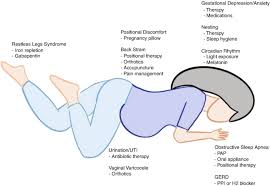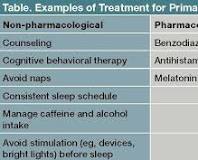Insomnia During Early Pregnancy: Causes and Coping Strategies
Insomnia, or difficulty falling and staying asleep, is a common issue that many women experience during early pregnancy. The hormonal changes, physical discomfort, and emotional stress associated with pregnancy can all contribute to sleep disturbances. Understanding the causes of insomnia during this crucial time and implementing effective coping strategies can help pregnant women get the rest they need for a healthy pregnancy.
Causes of Insomnia in Early Pregnancy
Several factors can contribute to insomnia during early pregnancy:
- Hormonal Changes: Fluctuations in hormone levels, particularly progesterone and estrogen, can disrupt the body’s natural sleep-wake cycle.
- Physical Discomfort: Symptoms such as nausea, frequent urination, back pain, and breast tenderness can make it challenging to find a comfortable sleeping position.
- Anxiety and Stress: The anticipation of motherhood, concerns about the health of the baby, and lifestyle adjustments can lead to increased anxiety and stress levels that interfere with sleep.
Coping Strategies for Insomnia
To manage insomnia during early pregnancy, consider implementing the following coping strategies:
- Establish a Bedtime Routine: Create a relaxing bedtime routine that signals to your body that it’s time to wind down. This may include gentle stretching, reading a book, or taking a warm bath.
- Maintain a Comfortable Sleep Environment: Ensure your bedroom is conducive to sleep by keeping it dark, quiet, and cool. Invest in a supportive mattress and pillows to alleviate physical discomfort.
- Practice Relaxation Techniques: Deep breathing exercises, meditation, or listening to calming music can help reduce anxiety and promote relaxation before bedtime.
- Avoid Stimulants: Limit your intake of caffeine and avoid consuming stimulating substances close to bedtime. Opt for decaffeinated beverages or herbal teas instead.
- Consult with Your Healthcare Provider: If insomnia persists or significantly impacts your daily functioning, consult with your healthcare provider. They may recommend safe sleep aids or other interventions to improve your sleep quality.
Remember that adequate rest is essential for both maternal health and fetal development during pregnancy. By understanding the causes of insomnia in early pregnancy and adopting effective coping strategies, you can prioritize your sleep health and well-being throughout this transformative journey.
5 Tips for Managing Insomnia During Early Pregnancy
- Establish a relaxing bedtime routine to signal your body that it’s time to sleep.
- Avoid caffeine and heavy meals close to bedtime.
- Create a comfortable sleeping environment with minimal light and noise.
- Consider gentle exercise or prenatal yoga during the day to promote better sleep at night.
- Talk to your healthcare provider about safe options for managing insomnia during early pregnancy.
Establish a relaxing bedtime routine to signal your body that it’s time to sleep.
Establishing a relaxing bedtime routine during early pregnancy is a valuable tip to help combat insomnia. By creating a consistent routine that includes calming activities such as gentle stretching, reading a book, or taking a warm bath, you can signal to your body that it’s time to wind down and prepare for sleep. This practice can help alleviate anxiety, promote relaxation, and improve your chances of falling asleep more easily and staying asleep longer during this crucial period of pregnancy.
Avoid caffeine and heavy meals close to bedtime.
To manage insomnia during early pregnancy, it is advisable to avoid consuming caffeine and heavy meals close to bedtime. Caffeine is a stimulant that can interfere with the ability to fall asleep and stay asleep, while heavy meals may lead to discomfort and indigestion, making it difficult to relax before bedtime. By steering clear of these stimulating substances and opting for lighter, well-balanced snacks or meals earlier in the evening, pregnant women can support better sleep hygiene and improve their chances of getting a restful night’s sleep during this crucial stage of pregnancy.
Create a comfortable sleeping environment with minimal light and noise.
To alleviate insomnia during early pregnancy, it is advisable to create a comfortable sleeping environment with minimal light and noise. By reducing external stimuli, such as light and noise, you can enhance your chances of falling and staying asleep. A dark and quiet bedroom promotes relaxation and signals to your body that it is time to rest, helping you achieve a more restful night’s sleep. This simple adjustment can significantly improve your sleep quality and contribute to your overall well-being during this crucial stage of pregnancy.
Consider gentle exercise or prenatal yoga during the day to promote better sleep at night.
Consider incorporating gentle exercise or prenatal yoga into your daily routine during early pregnancy to promote better sleep at night. Engaging in mild physical activity during the day can help reduce stress, improve circulation, and enhance relaxation, all of which contribute to a more restful night’s sleep. Prenatal yoga, specifically designed for expectant mothers, focuses on gentle stretches, breathing techniques, and relaxation exercises that can help alleviate physical discomfort and calm the mind, preparing you for a peaceful night of rest. By embracing these activities during the day, you can support your overall well-being and enhance your chances of experiencing quality sleep during this important stage of pregnancy.
Talk to your healthcare provider about safe options for managing insomnia during early pregnancy.
It is essential for pregnant women experiencing insomnia during early pregnancy to communicate with their healthcare provider about safe options for managing sleep disturbances. Consulting with a healthcare professional can help ensure that any interventions or treatments are appropriate and safe for both the mother and the developing baby. Healthcare providers can provide valuable guidance on effective strategies, such as relaxation techniques or safe sleep aids, tailored to address the specific needs of pregnant women experiencing insomnia. Open communication with a healthcare provider can lead to personalized solutions that promote better sleep quality and overall well-being during this critical stage of pregnancy.



